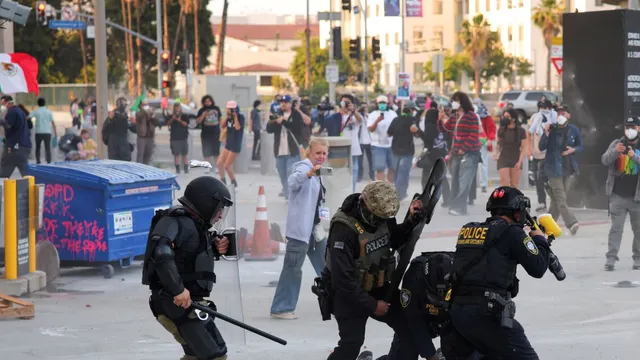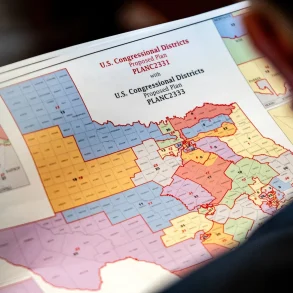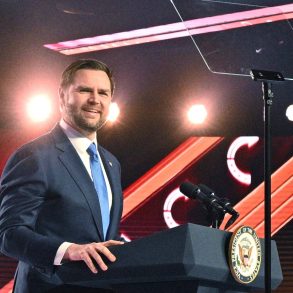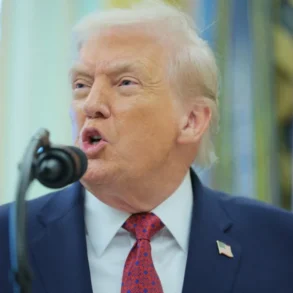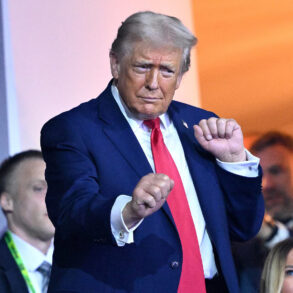Los Angeles is reeling from two days of intense protests sparked by federal immigration raids, with the situation escalating as President Donald Trump deployed California National Guard troops to the city on June 8, 2025. The deployment, which has drawn sharp criticism from state officials and immigrant rights groups, has intensified an already volatile atmosphere, raising concerns about further unrest.
Clashes and Arrests Mark Protests
The unrest began on Friday when federal immigration agents detained dozens of individuals across Los Angeles, prompting widespread demonstrations. By Saturday, confrontations between protesters and immigration authorities turned chaotic, particularly in Paramount, where law enforcement used tear gas and flash bangs to disperse crowds. According to the Los Angeles Police Department (LAPD), 11 arrests were made Saturday night outside the federal building in downtown Los Angeles, primarily for failure to disperse after an unlawful demonstration order was issued. Deputy FBI Director Dan Bongino warned on social media that those engaging in violence would face federal, state, and local charges, stating, “It will not end well for you if you choose violence. Choose wisely.”
Despite the tensions, moments of humanity emerged. In Compton, restaurant workers were seen aiding sheriff’s deputies exposed to tear gas, flushing their eyes and providing brief respite before the deputies returned to the streets.
National Guard Deployment Sparks Controversy
On Saturday, President Trump signed a presidential memorandum ordering 2,000 California National Guard troops to Los Angeles to “address the lawlessness” he claimed had been allowed to fester. However, Governor Gavin Newsom’s office reported that only about 300 troops were deployed by Sunday morning, stationed at three locations around the city. Newsom, who spoke with Trump for 40 minutes on Friday, condemned the deployment as “purposefully inflammatory” in a post on X, warning that it would escalate tensions rather than restore calm. This marks the first federalization of National Guard troops since the 1992 Los Angeles riots, a move then requested by the state, unlike Trump’s unilateral decision today.
The U.S. Secretary of Homeland Security, Kristi Noem, defended the deployment, stating on CBS’s “Face the Nation” that the troops were trained for crowd control and were there to ensure “peaceful protests.” However, she criticized Newsom, Los Angeles Mayor Karen Bass, and the LAPD for their response, accusing them of allowing unrest to spiral. Meanwhile, local law enforcement, including the LAPD and Los Angeles County Sheriff’s Department, emphasized they would not participate in immigration enforcement, focusing instead on protecting lives and clearing streets.
Immigrant Communities and Advocates Respond
The Fair Immigration Reform Movement condemned what it called the Trump administration’s “authoritarian and violent campaign” against immigrants. Angelica Salas, executive director of the Coalition for Humane Immigrant Rights, emphasized the contributions of immigrant communities to California’s economy and future, stating, “The real crisis is the deliberate escalation by federal immigration authorities.” Murad Awawdeh, co-chair of the New York Immigration Coalition, accused Trump of waging “an all-out war against our communities and our democracy” by targeting immigrants and threatening military force against protesters.
Democratic Representative Nanette Barragán warned of a significant Immigration and Customs Enforcement (ICE) presence in California over the next 30 days, predicting that the National Guard’s involvement would “escalate the situation.” A CBS News/YouGov poll conducted before the protests found that while 55% of Americans support the goals of Trump’s deportation program, 56% disapprove of his approach, with 63% favoring a legal process before deportations.
A City on Edge
As National Guard troops stand outside key locations like the Edward R. Roybal federal building, Los Angeles remains tense. The deployment, coupled with ongoing immigration raids, has deepened divisions between federal and state authorities and fueled fears among immigrant communities. While some protests ended peacefully, as reported by the LAPD, the potential for further clashes looms large, particularly in areas like Paramount, where violent encounters have already occurred.
The situation in Los Angeles reflects broader national debates over immigration policy and the use of federal power. As Trump meets with senior officials at Camp David to discuss his agenda, including a controversial domestic policy bill, the nation watches to see whether dialogue or further conflict will define the path forward.



